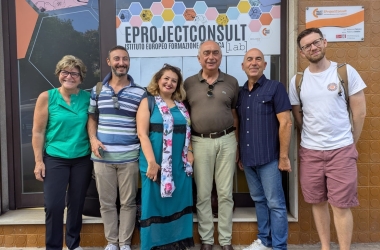First Wittenborg Staff Member Takes Part in Outgoing Erasmus+ Mobility Programme
First Wittenborg Staff Member Takes Part in Outgoing Erasmus+ Mobility Programme
First Wittenborg Staff Member Takes Part in Outgoing Erasmus+ Mobility Programme

Amal Abi Orm Attends Erasmus+ Training on EU Project Design and Management in Sicily
Amal Abi Orm, Financial Administrator at Wittenborg, recently travelled to Sicily, Italy, to participate in the training course 'EU Projects: Design and Management'. The course, which ran from 28 July to 1 August, was organised by the Associazione Artistica Culturale 'A Rocca' and EProjectConsult as part of the Erasmus+ KA131 Staff Mobility Project.
This marks a first for Wittenborg, as Orm is the school’s very first staff member to take part in outgoing Erasmus+ staff mobility — building on previous incoming Erasmus+ activities and other international exchanges.
Learning the full EU project lifecycle
The training brought together six participants: Orm, two colleagues from Ireland representing Meath Partnership, and three from Italy based at the Comune di Messina. Together, they explored the complete process of EU project management, from the initial proposal writing stage to the final reporting phase.
Orm explained that the training addressed all key stages of project work: “The purpose of this training is helping me to ensure accurate budget management, transparent reporting and audit readiness for our organisation. Going through the full project lifecycle, from writing proposals, building consortia, proposal submission, project approval to final reporting, will help me have a better understanding and assist my team at Wittenborg more effectively.”
She also enjoyed the cultural side of the experience: “Every day was a pleasure thanks to the delicious local food and the beautiful Mediterranean weather. It was also great to share the experience with trainees from different cultural backgrounds.”
Erasmus+ in Wittenborg’s strategy
Aydan Holtrigter, Research Centre Manager, explained how this training fits into Wittenborg’s broader internationalisation strategy.
“Erasmus+ mobility supports Wittenborg’s mission to foster global engagement and lifelong learning by enabling staff to participate in teaching and training mobility across Europe. This initiative aligns with our strategic goals of enhancing intercultural competencies, expanding international partnerships and integrating global perspectives into our academic and operational frameworks.”
She noted that the programme is embedded in Wittenborg’s commitment to internationalisation through the Erasmus Charter for Higher Education 2021–2027, which facilitates participation in mobility and cooperation projects.
“The purpose of Erasmus+ mobility is to promote staff development through international exposure, strengthen institutional ties with partner universities and enhance the quality and competitiveness of Wittenborg.”
Benefits for teaching, research and collaboration
Holtrigter emphasised that the benefits extend well beyond individual development:
“Staff gain new pedagogical insights and methods by engaging with diverse educational systems, which can be integrated into Wittenborg’s curriculum. Mobility fosters collaboration with international peers, opens doors to joint research projects and broadens our academic networks. It also strengthens cross-border cooperation, innovation and knowledge exchange.”
She added that such experiences help staff develop important soft skills including intercultural communication, adaptability and leadership.
Opportunities for staff
The Erasmus+ KA131 programme offers both teaching and training activities. Teaching assignments allow staff to deliver lectures, seminars or workshops at partner institutions, with a minimum of eight hours of teaching. These assignments give staff the chance to share their expertise with international peers while gaining insights into different educational approaches.
Training activities are available to both faculty and professional staff. These can include courses, job-shadowing or workshops focused on professional development, allowing participants to build new skills, explore different working methods and strengthen their knowledge in their area of expertise.
“Choosing the right host institution or training event is key,” Holtrigter said. “Staff should consider the professional relevance of the opportunity, ensure it aligns with Wittenborg’s values of internationalisation, diversity and ethics, and make use of our existing partnerships with institutions in Slovenia, Poland, Estonia, Georgia and Azerbaijan.”
She recommended using online platforms to find suitable opportunities:
“One useful platform for training purposes is staffmobility.eu, which offers a broad variety of courses. Staff are encouraged to initiate or join projects that contribute to Wittenborg’s strategic development and academic excellence.
"The Head of School, Research Centre or a direct supervisor can help find a suitable opportunity that aligns with individual development plans. More details on requirements, eligible countries and other guidelines can be found in the Mobility Policy for staff.”
WUP 18/08/2025
by Erene Roux
©WUAS Press
Tags
#SDG17: Partnerships to achieve the Goal
#Internationalisation
#Diversity
#Ethics
#Erasmus+
#research
#ResearchCentre
713 words